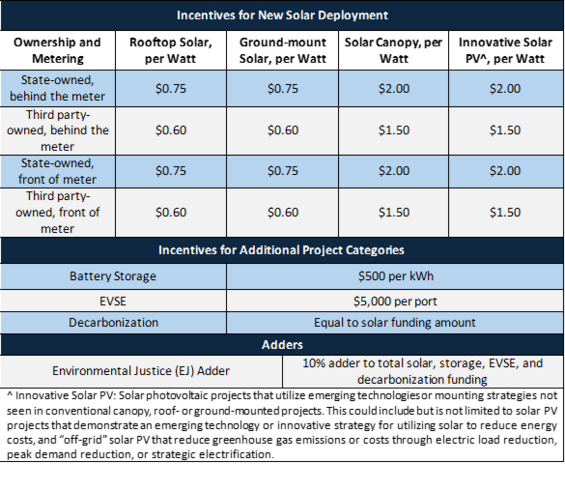Grant Program Information and Eligibility
Leading by Example Executive Order 594: Decarbonizing and Minimizing Environmental Impacts of State Government (EO 594), sets objectives and targets related to onsite renewable generation and decarbonization (i.e., strategic electrification of buildings and elimination of onsite fossil fuel consumption). In alignment with these goals, this Program aims to support the affordability of new integrated solar PV* installations at state facilities that will assist Commonwealth agencies and campuses to reduce energy costs while also supporting the aggressive clean energy targets for state government operations, decarbonization goals, and grid intermittency.
The LBE Solar-Decarbonization Grant Program is funded exclusively through Alternative Compliance Payments from the state’s Renewable and Alternative Energy Portfolio Standard programs that are administered by DOER. The Solar-Decarbonization Programprovides enhanced incentives for new state solar PV deployment, battery energy storage, electric vehicle charging, and decarbonization efforts to provide financial support to state entities in meeting EO 594 targets and objectives.
*LBE utilizes the term “integrated solar” to refer to solar installations that advance broader statewide and LBE goals beyond electricity generation. This means that solar canopy projects must include electric vehicle (EV) charging infrastructure and projects over a certain size threshold must include battery energy storage installation.
Basic grant program and eligibility information can be found in the table below:
| Grant Program Information & Eligibility | |
|---|---|
| Applicant Eligibility | Any executive agency, state institution of higher education, or quasi-public state entity |
| Total Program Funding Available | $25,000,000 |
| Maximum Award per Individual Project | $2,500,000 |
| Schedule | Applications will be accepted and reviewed on a rolling basis until allocated funds are awarded |
| PON Response Deadline | June 30, 2027 |
| Additional Information | Projects must comply with all program requirements detailed in the program opportunity notice (PON) on COMMBUYS |
Incentive Structures

Eligible Costs by Project Category
Eligible costs by project category include but are not limited to the following:
Solar PV and Battery Energy Storage Funding
Grant funds, regardless of system ownership, can only be used for costs associated with the deployment of new solar PV, which may or may not include adjunct battery energy storage installation (NOTE: the Program requires that solar PV projects of any type that are ≥500 kW AC capacity must evaluate and include battery energy storage unless not technically or fiscally feasible).
- Solar panels and related equipment procurement
- Related structural systems procurement
- Costs demonstrably related to battery energy storage systems or storage ready
- Interconnection and permitting costs
- Commencement of construction (site prep) or installation
EVSE Charging Port Installation Funding
- Networked or non-networked Level 1 or Level 2 charging equipment
- Site assessment costs
- Installation costs
- Commissioning costs
- Up to 3 years of prepaid networking, maintenance, and extended warranty packages
Decarbonization Funding
- Actual decarbonization conversions
- Site electrification preparation
- Building envelope improvements
- Other projects that facilitate facility decarbonization
Program Requirements
Requirements by Project Type
Any requirements for each project type can be found in Section 4 D – I in the grant PON: (D) solar canopy, (E) rooftop solar PV, (F) ground-mount solar PV, (G) innovative solar PV, (H) battery energy storage, (I) decarbonization.
Embodied Carbon Offset Requirements
Executive Order 594 directs state entities to implement strategies to reduce embodied carbon contained in building materials and further directs DOER to incorporate embodied carbon considerations into its programs. All solar projects contain embodied carbon. Therefore, any solar canopy, rooftop, or ground-mount projects receiving funds through this PON are required to offset the estimated equivalent embodied carbon of the project (e.g., from the production of steel and/or PV panels). Innovative Solar PV projects are exempt from this requirement.
The embodied carbon offset options listed below use the purchase or retirement of renewable energy certificates (RECs). Projects that are receiving Class I RECs have three options available to them, while projects enrolled in the SMART program have just one as outlined in Section 4C of the PON.
Application Process and Required Documents
- Confirm Eligibility: Potential applicants are encouraged to contact LBE-Grants@mass.gov prior to submitting a grant application to confirm eligibility and availability of funds.
- Submit Application: Applications and attachments must be submitted to LBE-Grants@mass.gov.
Guidance and Helpful Resources
Eligible state entities may wish to refer to documents developed by LBE for guidance, information on SMART and utility incentives, and other helpful resources.
SMART Program – Information on incentives through the program which is managed by DOER and upcoming changes to the program.
MassCEC Commercial Solar – Information about how solar works, available incentives, costs and performance, and more.
Clean Peak Energy Standard (CPS) – Provides incentives to clean energy technologies that can supply electricity or reduce demand during seasonal peak demand periods established by DOER.
ConnectedSolutions (Eversource and National Grid) – Offers incentives to entities for dispatching electricity from their batteries during periods of peak demand.
LBE Fleet EV Charging Deployment Grant Program - Provides funding for up to 100% of the costs of EV charging station equipment, installation, pre-wiring, and several years of maintenance and data packages.
MassEVIP Charging Incentives - Provides funding for EV charging stations for fleets and workplaces (MassEVIP Workplace and Fleet Charging), and the general public (MassEVIP Public Access Charging).
Eversource EV Charging Incentives&National Grid EV Charging Incentives - Cover certain costs associated with infrastructure upgrades and some equipment.
Additional Resources
-
Open PDF file, 3.44 MB, LBE Solar-Decarb Grant Overview Webinar (English, PDF 3.44 MB)
-
Open PDF file, 254.3 KB, LBE Solar-Decarb Grant One-Pager (English, PDF 254.3 KB)